Corporate Governance and Ethics Report: System04104, Analysis
VerifiedAdded on 2022/12/16
|13
|3972
|355
Report
AI Summary
This report analyzes the findings of the Banking Royal Commission, also known as the Hayne Royal Commission, which investigated unethical practices in the Australian banking and financial services sector. It begins with an executive summary highlighting the commission's discovery of widespread misconduct, including breaches of ethical standards and corporate governance failures. The report delves into the ethical issues, such as charging hidden fees, misleading customers, and misusing funds. It then explores relevant ethical theories, including utilitarianism, deontology, and virtue ethics, with a focus on how the utilitarian theory was breached by the banking sector. The report includes a case study of Freedom Insurance Group to evaluate unethical practices, and also highlights the need for stronger regulatory oversight and a robust ethical culture within financial institutions. The report concludes by emphasizing the importance of ethical behavior and good corporate governance to prevent future misconduct and maintain public trust in the financial system. The report also recommends that the regulatory body strictly follows the laws and supervise the business operation of the organisation, these unethical practices can be prevented.
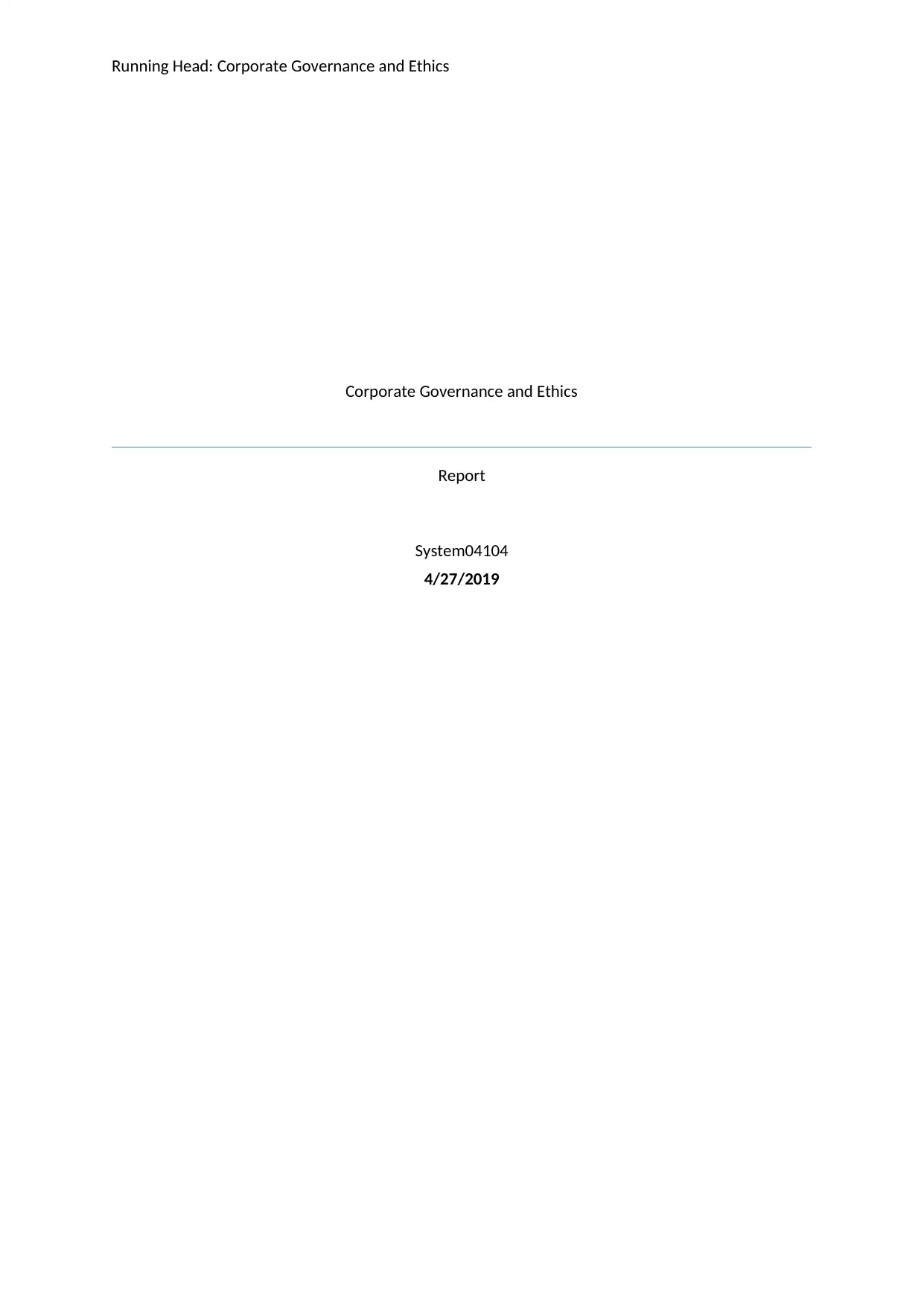
Running Head: Corporate Governance and Ethics
Corporate Governance and Ethics
Report
System04104
4/27/2019
Corporate Governance and Ethics
Report
System04104
4/27/2019
Paraphrase This Document
Need a fresh take? Get an instant paraphrase of this document with our AI Paraphraser
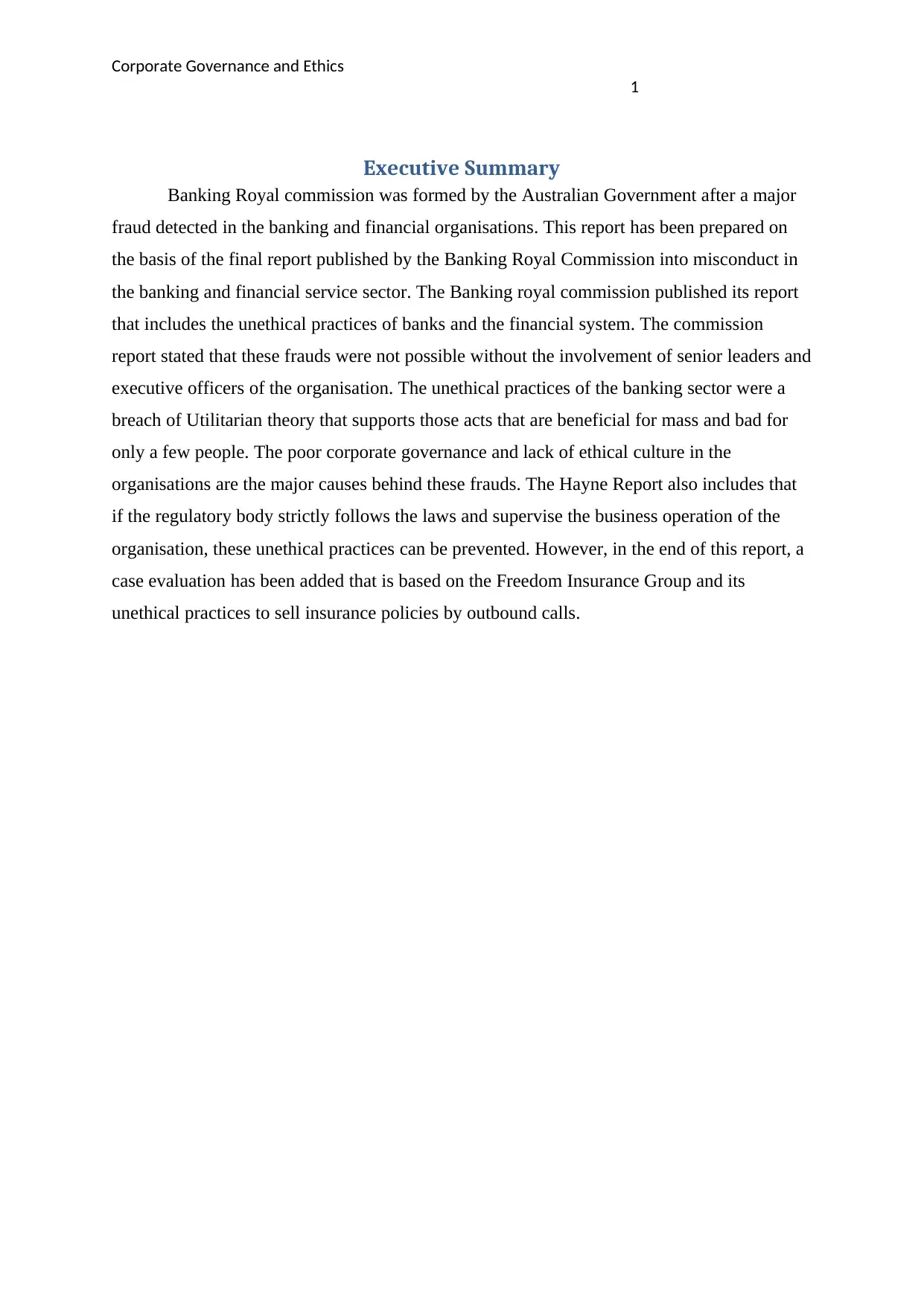
Corporate Governance and Ethics
1
Executive Summary
Banking Royal commission was formed by the Australian Government after a major
fraud detected in the banking and financial organisations. This report has been prepared on
the basis of the final report published by the Banking Royal Commission into misconduct in
the banking and financial service sector. The Banking royal commission published its report
that includes the unethical practices of banks and the financial system. The commission
report stated that these frauds were not possible without the involvement of senior leaders and
executive officers of the organisation. The unethical practices of the banking sector were a
breach of Utilitarian theory that supports those acts that are beneficial for mass and bad for
only a few people. The poor corporate governance and lack of ethical culture in the
organisations are the major causes behind these frauds. The Hayne Report also includes that
if the regulatory body strictly follows the laws and supervise the business operation of the
organisation, these unethical practices can be prevented. However, in the end of this report, a
case evaluation has been added that is based on the Freedom Insurance Group and its
unethical practices to sell insurance policies by outbound calls.
1
Executive Summary
Banking Royal commission was formed by the Australian Government after a major
fraud detected in the banking and financial organisations. This report has been prepared on
the basis of the final report published by the Banking Royal Commission into misconduct in
the banking and financial service sector. The Banking royal commission published its report
that includes the unethical practices of banks and the financial system. The commission
report stated that these frauds were not possible without the involvement of senior leaders and
executive officers of the organisation. The unethical practices of the banking sector were a
breach of Utilitarian theory that supports those acts that are beneficial for mass and bad for
only a few people. The poor corporate governance and lack of ethical culture in the
organisations are the major causes behind these frauds. The Hayne Report also includes that
if the regulatory body strictly follows the laws and supervise the business operation of the
organisation, these unethical practices can be prevented. However, in the end of this report, a
case evaluation has been added that is based on the Freedom Insurance Group and its
unethical practices to sell insurance policies by outbound calls.
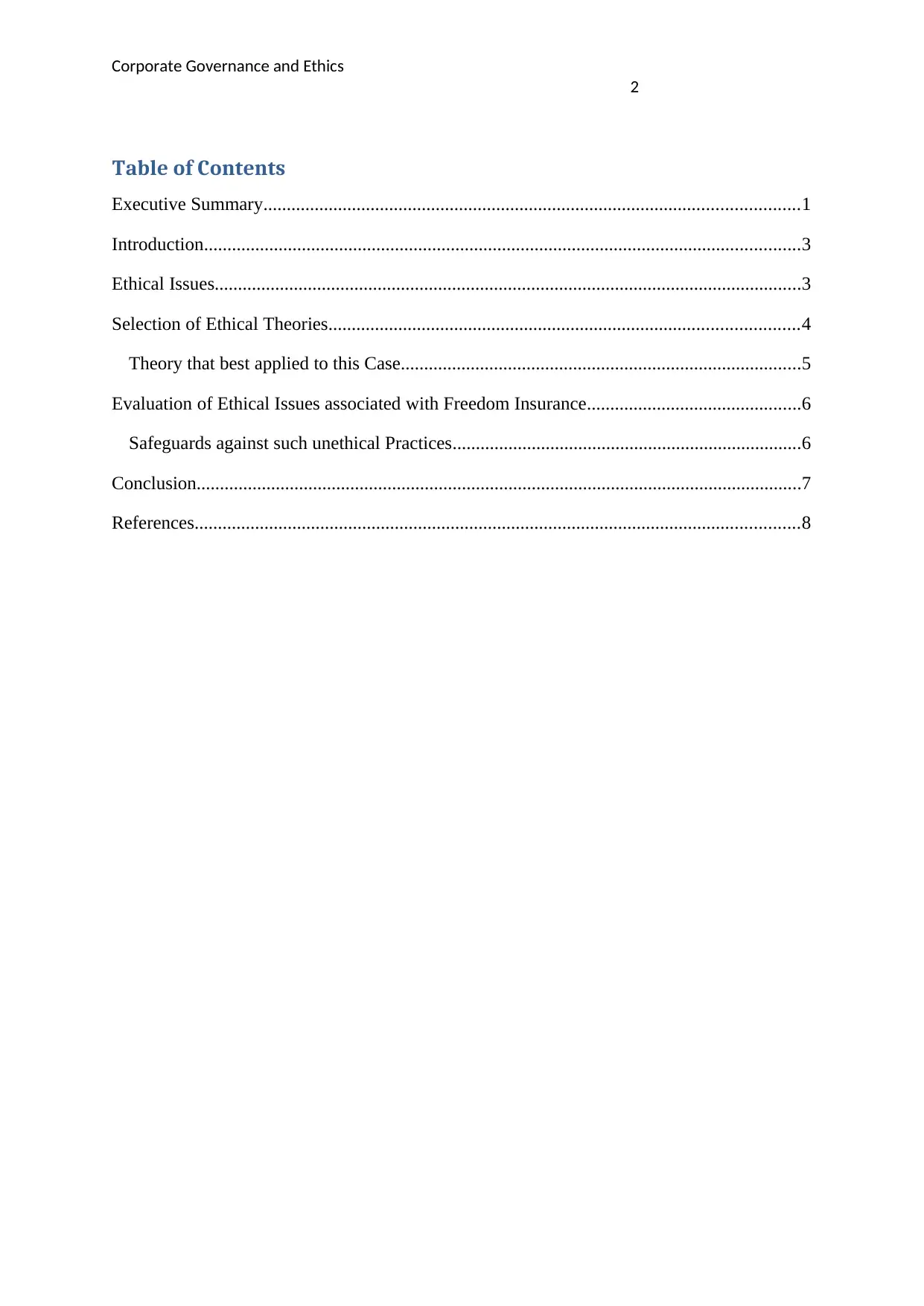
Corporate Governance and Ethics
2
Table of Contents
Executive Summary...................................................................................................................1
Introduction................................................................................................................................3
Ethical Issues..............................................................................................................................3
Selection of Ethical Theories.....................................................................................................4
Theory that best applied to this Case......................................................................................5
Evaluation of Ethical Issues associated with Freedom Insurance..............................................6
Safeguards against such unethical Practices...........................................................................6
Conclusion..................................................................................................................................7
References..................................................................................................................................8
2
Table of Contents
Executive Summary...................................................................................................................1
Introduction................................................................................................................................3
Ethical Issues..............................................................................................................................3
Selection of Ethical Theories.....................................................................................................4
Theory that best applied to this Case......................................................................................5
Evaluation of Ethical Issues associated with Freedom Insurance..............................................6
Safeguards against such unethical Practices...........................................................................6
Conclusion..................................................................................................................................7
References..................................................................................................................................8
⊘ This is a preview!⊘
Do you want full access?
Subscribe today to unlock all pages.

Trusted by 1+ million students worldwide
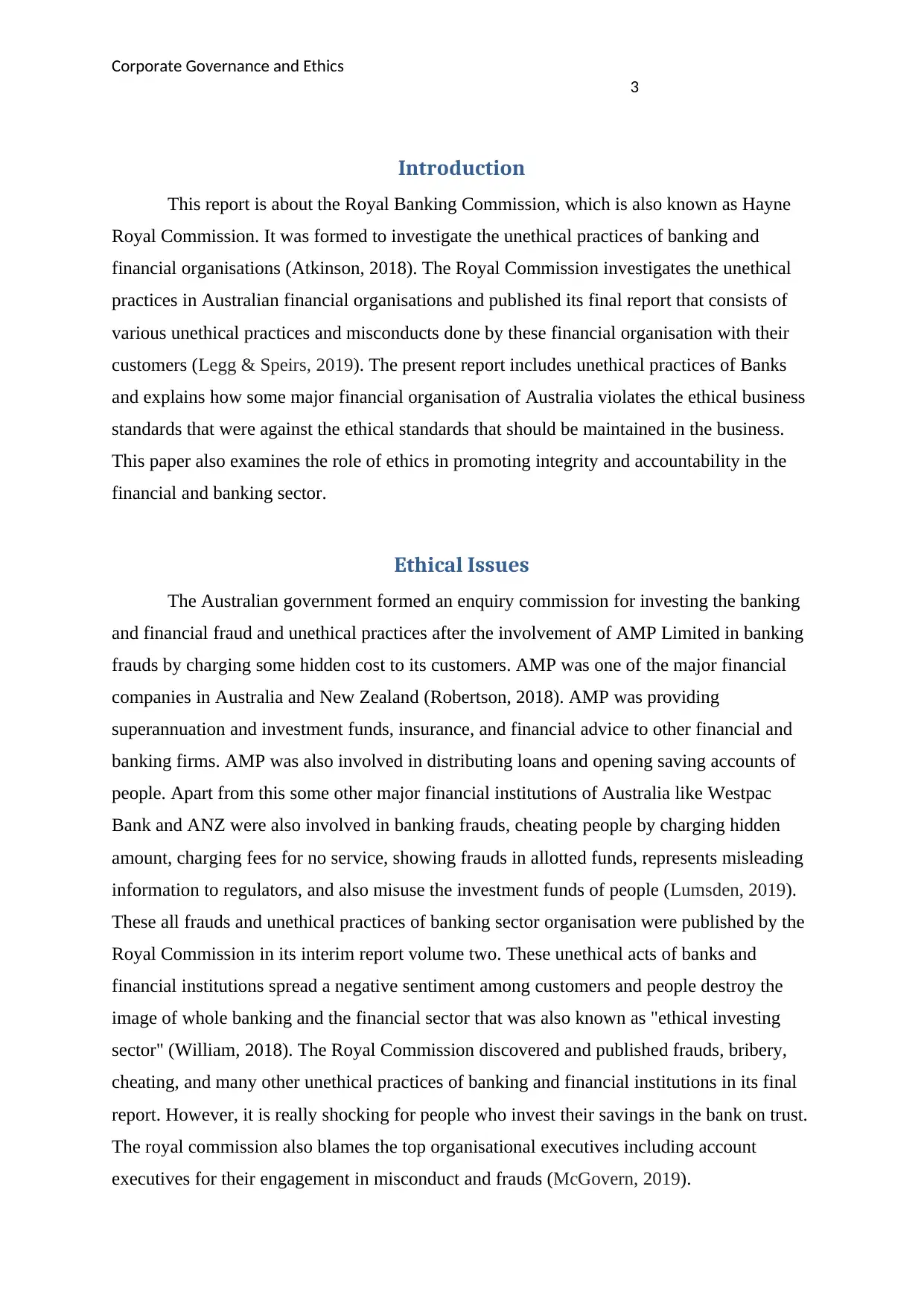
Corporate Governance and Ethics
3
Introduction
This report is about the Royal Banking Commission, which is also known as Hayne
Royal Commission. It was formed to investigate the unethical practices of banking and
financial organisations (Atkinson, 2018). The Royal Commission investigates the unethical
practices in Australian financial organisations and published its final report that consists of
various unethical practices and misconducts done by these financial organisation with their
customers (Legg & Speirs, 2019). The present report includes unethical practices of Banks
and explains how some major financial organisation of Australia violates the ethical business
standards that were against the ethical standards that should be maintained in the business.
This paper also examines the role of ethics in promoting integrity and accountability in the
financial and banking sector.
Ethical Issues
The Australian government formed an enquiry commission for investing the banking
and financial fraud and unethical practices after the involvement of AMP Limited in banking
frauds by charging some hidden cost to its customers. AMP was one of the major financial
companies in Australia and New Zealand (Robertson, 2018). AMP was providing
superannuation and investment funds, insurance, and financial advice to other financial and
banking firms. AMP was also involved in distributing loans and opening saving accounts of
people. Apart from this some other major financial institutions of Australia like Westpac
Bank and ANZ were also involved in banking frauds, cheating people by charging hidden
amount, charging fees for no service, showing frauds in allotted funds, represents misleading
information to regulators, and also misuse the investment funds of people (Lumsden, 2019).
These all frauds and unethical practices of banking sector organisation were published by the
Royal Commission in its interim report volume two. These unethical acts of banks and
financial institutions spread a negative sentiment among customers and people destroy the
image of whole banking and the financial sector that was also known as "ethical investing
sector" (William, 2018). The Royal Commission discovered and published frauds, bribery,
cheating, and many other unethical practices of banking and financial institutions in its final
report. However, it is really shocking for people who invest their savings in the bank on trust.
The royal commission also blames the top organisational executives including account
executives for their engagement in misconduct and frauds (McGovern, 2019).
3
Introduction
This report is about the Royal Banking Commission, which is also known as Hayne
Royal Commission. It was formed to investigate the unethical practices of banking and
financial organisations (Atkinson, 2018). The Royal Commission investigates the unethical
practices in Australian financial organisations and published its final report that consists of
various unethical practices and misconducts done by these financial organisation with their
customers (Legg & Speirs, 2019). The present report includes unethical practices of Banks
and explains how some major financial organisation of Australia violates the ethical business
standards that were against the ethical standards that should be maintained in the business.
This paper also examines the role of ethics in promoting integrity and accountability in the
financial and banking sector.
Ethical Issues
The Australian government formed an enquiry commission for investing the banking
and financial fraud and unethical practices after the involvement of AMP Limited in banking
frauds by charging some hidden cost to its customers. AMP was one of the major financial
companies in Australia and New Zealand (Robertson, 2018). AMP was providing
superannuation and investment funds, insurance, and financial advice to other financial and
banking firms. AMP was also involved in distributing loans and opening saving accounts of
people. Apart from this some other major financial institutions of Australia like Westpac
Bank and ANZ were also involved in banking frauds, cheating people by charging hidden
amount, charging fees for no service, showing frauds in allotted funds, represents misleading
information to regulators, and also misuse the investment funds of people (Lumsden, 2019).
These all frauds and unethical practices of banking sector organisation were published by the
Royal Commission in its interim report volume two. These unethical acts of banks and
financial institutions spread a negative sentiment among customers and people destroy the
image of whole banking and the financial sector that was also known as "ethical investing
sector" (William, 2018). The Royal Commission discovered and published frauds, bribery,
cheating, and many other unethical practices of banking and financial institutions in its final
report. However, it is really shocking for people who invest their savings in the bank on trust.
The royal commission also blames the top organisational executives including account
executives for their engagement in misconduct and frauds (McGovern, 2019).
Paraphrase This Document
Need a fresh take? Get an instant paraphrase of this document with our AI Paraphraser
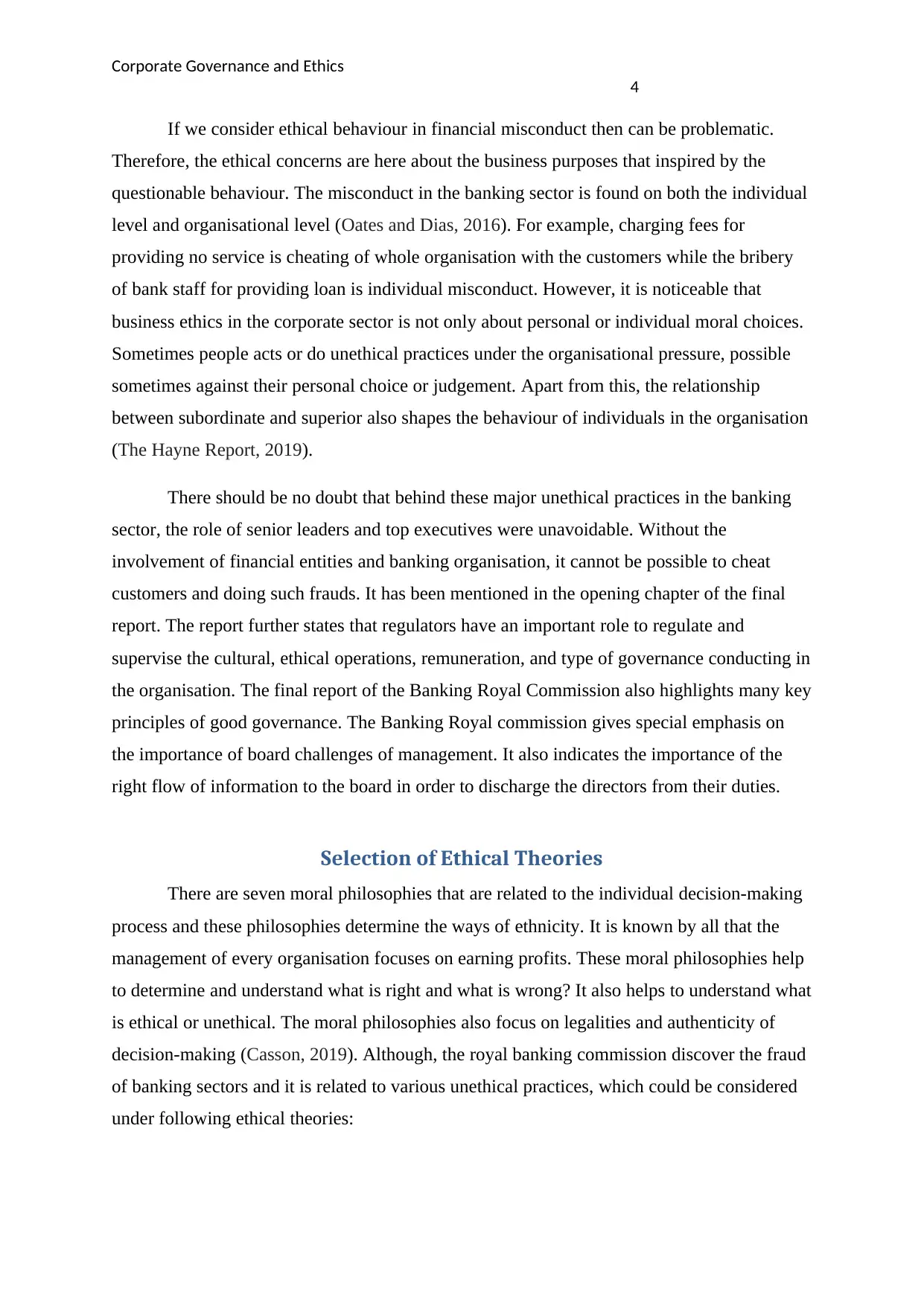
Corporate Governance and Ethics
4
If we consider ethical behaviour in financial misconduct then can be problematic.
Therefore, the ethical concerns are here about the business purposes that inspired by the
questionable behaviour. The misconduct in the banking sector is found on both the individual
level and organisational level (Oates and Dias, 2016). For example, charging fees for
providing no service is cheating of whole organisation with the customers while the bribery
of bank staff for providing loan is individual misconduct. However, it is noticeable that
business ethics in the corporate sector is not only about personal or individual moral choices.
Sometimes people acts or do unethical practices under the organisational pressure, possible
sometimes against their personal choice or judgement. Apart from this, the relationship
between subordinate and superior also shapes the behaviour of individuals in the organisation
(The Hayne Report, 2019).
There should be no doubt that behind these major unethical practices in the banking
sector, the role of senior leaders and top executives were unavoidable. Without the
involvement of financial entities and banking organisation, it cannot be possible to cheat
customers and doing such frauds. It has been mentioned in the opening chapter of the final
report. The report further states that regulators have an important role to regulate and
supervise the cultural, ethical operations, remuneration, and type of governance conducting in
the organisation. The final report of the Banking Royal Commission also highlights many key
principles of good governance. The Banking Royal commission gives special emphasis on
the importance of board challenges of management. It also indicates the importance of the
right flow of information to the board in order to discharge the directors from their duties.
Selection of Ethical Theories
There are seven moral philosophies that are related to the individual decision-making
process and these philosophies determine the ways of ethnicity. It is known by all that the
management of every organisation focuses on earning profits. These moral philosophies help
to determine and understand what is right and what is wrong? It also helps to understand what
is ethical or unethical. The moral philosophies also focus on legalities and authenticity of
decision-making (Casson, 2019). Although, the royal banking commission discover the fraud
of banking sectors and it is related to various unethical practices, which could be considered
under following ethical theories:
4
If we consider ethical behaviour in financial misconduct then can be problematic.
Therefore, the ethical concerns are here about the business purposes that inspired by the
questionable behaviour. The misconduct in the banking sector is found on both the individual
level and organisational level (Oates and Dias, 2016). For example, charging fees for
providing no service is cheating of whole organisation with the customers while the bribery
of bank staff for providing loan is individual misconduct. However, it is noticeable that
business ethics in the corporate sector is not only about personal or individual moral choices.
Sometimes people acts or do unethical practices under the organisational pressure, possible
sometimes against their personal choice or judgement. Apart from this, the relationship
between subordinate and superior also shapes the behaviour of individuals in the organisation
(The Hayne Report, 2019).
There should be no doubt that behind these major unethical practices in the banking
sector, the role of senior leaders and top executives were unavoidable. Without the
involvement of financial entities and banking organisation, it cannot be possible to cheat
customers and doing such frauds. It has been mentioned in the opening chapter of the final
report. The report further states that regulators have an important role to regulate and
supervise the cultural, ethical operations, remuneration, and type of governance conducting in
the organisation. The final report of the Banking Royal Commission also highlights many key
principles of good governance. The Banking Royal commission gives special emphasis on
the importance of board challenges of management. It also indicates the importance of the
right flow of information to the board in order to discharge the directors from their duties.
Selection of Ethical Theories
There are seven moral philosophies that are related to the individual decision-making
process and these philosophies determine the ways of ethnicity. It is known by all that the
management of every organisation focuses on earning profits. These moral philosophies help
to determine and understand what is right and what is wrong? It also helps to understand what
is ethical or unethical. The moral philosophies also focus on legalities and authenticity of
decision-making (Casson, 2019). Although, the royal banking commission discover the fraud
of banking sectors and it is related to various unethical practices, which could be considered
under following ethical theories:
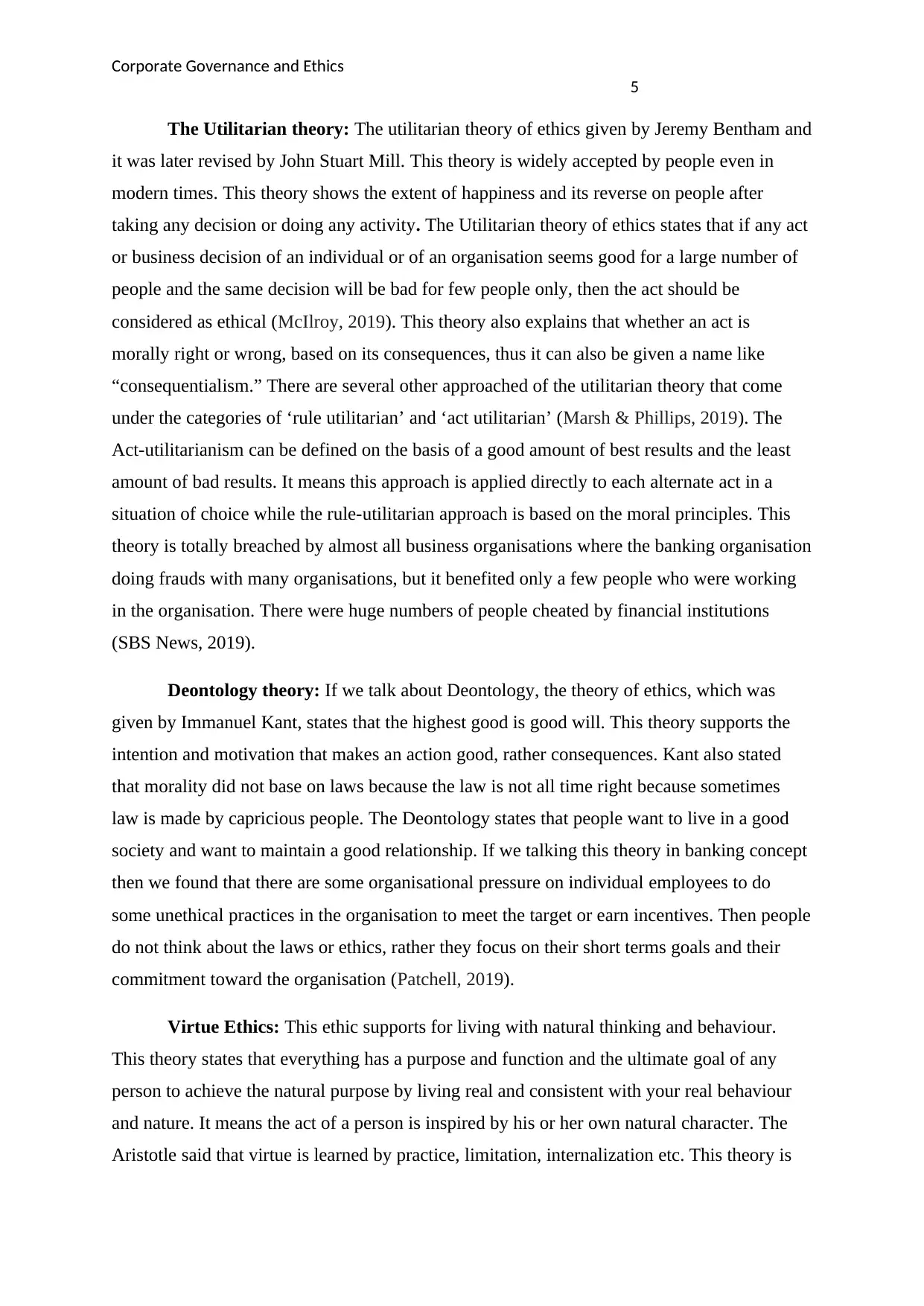
Corporate Governance and Ethics
5
The Utilitarian theory: The utilitarian theory of ethics given by Jeremy Bentham and
it was later revised by John Stuart Mill. This theory is widely accepted by people even in
modern times. This theory shows the extent of happiness and its reverse on people after
taking any decision or doing any activity. The Utilitarian theory of ethics states that if any act
or business decision of an individual or of an organisation seems good for a large number of
people and the same decision will be bad for few people only, then the act should be
considered as ethical (McIlroy, 2019). This theory also explains that whether an act is
morally right or wrong, based on its consequences, thus it can also be given a name like
“consequentialism.” There are several other approached of the utilitarian theory that come
under the categories of ‘rule utilitarian’ and ‘act utilitarian’ (Marsh & Phillips, 2019). The
Act-utilitarianism can be defined on the basis of a good amount of best results and the least
amount of bad results. It means this approach is applied directly to each alternate act in a
situation of choice while the rule-utilitarian approach is based on the moral principles. This
theory is totally breached by almost all business organisations where the banking organisation
doing frauds with many organisations, but it benefited only a few people who were working
in the organisation. There were huge numbers of people cheated by financial institutions
(SBS News, 2019).
Deontology theory: If we talk about Deontology, the theory of ethics, which was
given by Immanuel Kant, states that the highest good is good will. This theory supports the
intention and motivation that makes an action good, rather consequences. Kant also stated
that morality did not base on laws because the law is not all time right because sometimes
law is made by capricious people. The Deontology states that people want to live in a good
society and want to maintain a good relationship. If we talking this theory in banking concept
then we found that there are some organisational pressure on individual employees to do
some unethical practices in the organisation to meet the target or earn incentives. Then people
do not think about the laws or ethics, rather they focus on their short terms goals and their
commitment toward the organisation (Patchell, 2019).
Virtue Ethics: This ethic supports for living with natural thinking and behaviour.
This theory states that everything has a purpose and function and the ultimate goal of any
person to achieve the natural purpose by living real and consistent with your real behaviour
and nature. It means the act of a person is inspired by his or her own natural character. The
Aristotle said that virtue is learned by practice, limitation, internalization etc. This theory is
5
The Utilitarian theory: The utilitarian theory of ethics given by Jeremy Bentham and
it was later revised by John Stuart Mill. This theory is widely accepted by people even in
modern times. This theory shows the extent of happiness and its reverse on people after
taking any decision or doing any activity. The Utilitarian theory of ethics states that if any act
or business decision of an individual or of an organisation seems good for a large number of
people and the same decision will be bad for few people only, then the act should be
considered as ethical (McIlroy, 2019). This theory also explains that whether an act is
morally right or wrong, based on its consequences, thus it can also be given a name like
“consequentialism.” There are several other approached of the utilitarian theory that come
under the categories of ‘rule utilitarian’ and ‘act utilitarian’ (Marsh & Phillips, 2019). The
Act-utilitarianism can be defined on the basis of a good amount of best results and the least
amount of bad results. It means this approach is applied directly to each alternate act in a
situation of choice while the rule-utilitarian approach is based on the moral principles. This
theory is totally breached by almost all business organisations where the banking organisation
doing frauds with many organisations, but it benefited only a few people who were working
in the organisation. There were huge numbers of people cheated by financial institutions
(SBS News, 2019).
Deontology theory: If we talk about Deontology, the theory of ethics, which was
given by Immanuel Kant, states that the highest good is good will. This theory supports the
intention and motivation that makes an action good, rather consequences. Kant also stated
that morality did not base on laws because the law is not all time right because sometimes
law is made by capricious people. The Deontology states that people want to live in a good
society and want to maintain a good relationship. If we talking this theory in banking concept
then we found that there are some organisational pressure on individual employees to do
some unethical practices in the organisation to meet the target or earn incentives. Then people
do not think about the laws or ethics, rather they focus on their short terms goals and their
commitment toward the organisation (Patchell, 2019).
Virtue Ethics: This ethic supports for living with natural thinking and behaviour.
This theory states that everything has a purpose and function and the ultimate goal of any
person to achieve the natural purpose by living real and consistent with your real behaviour
and nature. It means the act of a person is inspired by his or her own natural character. The
Aristotle said that virtue is learned by practice, limitation, internalization etc. This theory is
⊘ This is a preview!⊘
Do you want full access?
Subscribe today to unlock all pages.

Trusted by 1+ million students worldwide
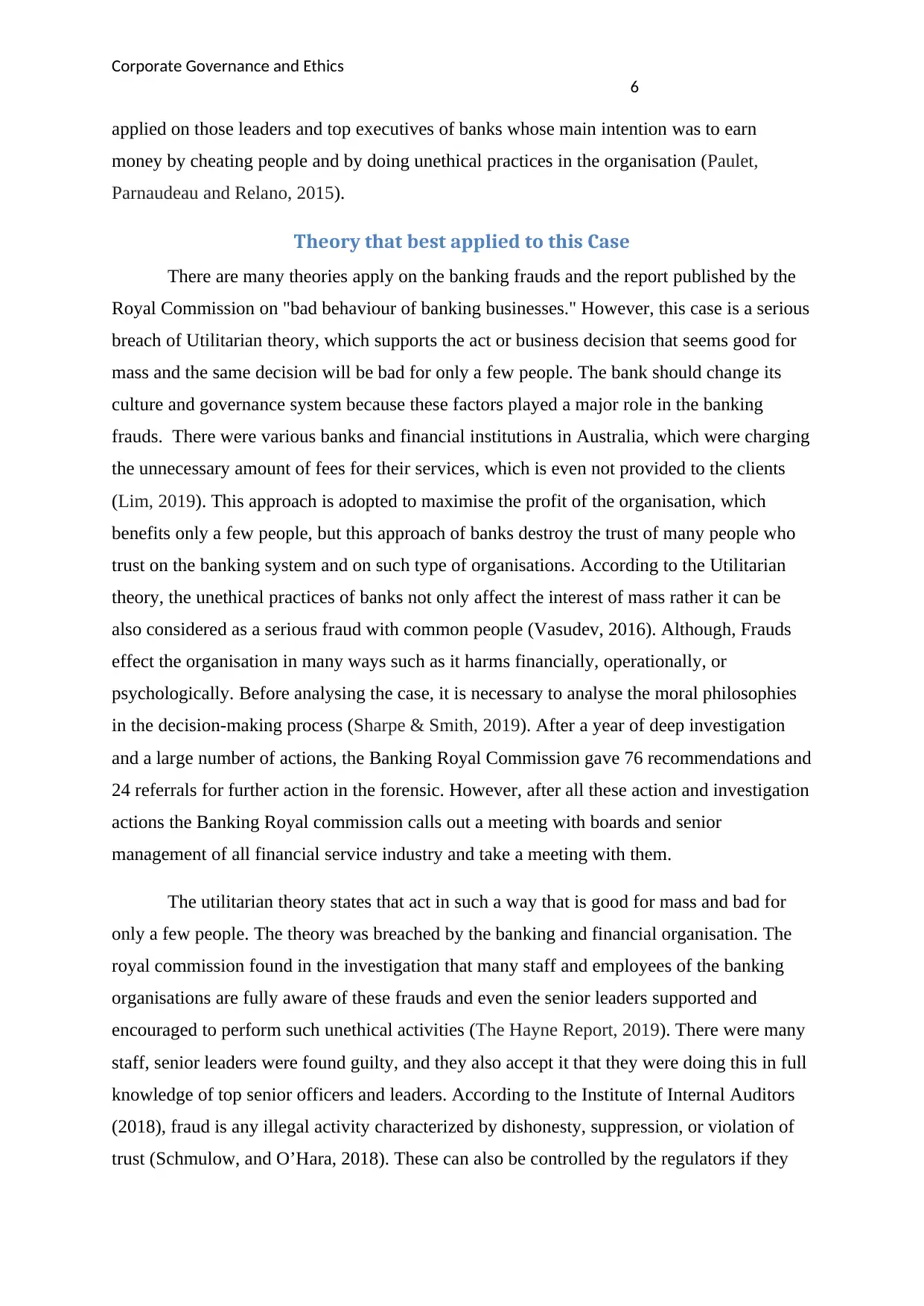
Corporate Governance and Ethics
6
applied on those leaders and top executives of banks whose main intention was to earn
money by cheating people and by doing unethical practices in the organisation (Paulet,
Parnaudeau and Relano, 2015).
Theory that best applied to this Case
There are many theories apply on the banking frauds and the report published by the
Royal Commission on "bad behaviour of banking businesses." However, this case is a serious
breach of Utilitarian theory, which supports the act or business decision that seems good for
mass and the same decision will be bad for only a few people. The bank should change its
culture and governance system because these factors played a major role in the banking
frauds. There were various banks and financial institutions in Australia, which were charging
the unnecessary amount of fees for their services, which is even not provided to the clients
(Lim, 2019). This approach is adopted to maximise the profit of the organisation, which
benefits only a few people, but this approach of banks destroy the trust of many people who
trust on the banking system and on such type of organisations. According to the Utilitarian
theory, the unethical practices of banks not only affect the interest of mass rather it can be
also considered as a serious fraud with common people (Vasudev, 2016). Although, Frauds
effect the organisation in many ways such as it harms financially, operationally, or
psychologically. Before analysing the case, it is necessary to analyse the moral philosophies
in the decision-making process (Sharpe & Smith, 2019). After a year of deep investigation
and a large number of actions, the Banking Royal Commission gave 76 recommendations and
24 referrals for further action in the forensic. However, after all these action and investigation
actions the Banking Royal commission calls out a meeting with boards and senior
management of all financial service industry and take a meeting with them.
The utilitarian theory states that act in such a way that is good for mass and bad for
only a few people. The theory was breached by the banking and financial organisation. The
royal commission found in the investigation that many staff and employees of the banking
organisations are fully aware of these frauds and even the senior leaders supported and
encouraged to perform such unethical activities (The Hayne Report, 2019). There were many
staff, senior leaders were found guilty, and they also accept it that they were doing this in full
knowledge of top senior officers and leaders. According to the Institute of Internal Auditors
(2018), fraud is any illegal activity characterized by dishonesty, suppression, or violation of
trust (Schmulow, and O’Hara, 2018). These can also be controlled by the regulators if they
6
applied on those leaders and top executives of banks whose main intention was to earn
money by cheating people and by doing unethical practices in the organisation (Paulet,
Parnaudeau and Relano, 2015).
Theory that best applied to this Case
There are many theories apply on the banking frauds and the report published by the
Royal Commission on "bad behaviour of banking businesses." However, this case is a serious
breach of Utilitarian theory, which supports the act or business decision that seems good for
mass and the same decision will be bad for only a few people. The bank should change its
culture and governance system because these factors played a major role in the banking
frauds. There were various banks and financial institutions in Australia, which were charging
the unnecessary amount of fees for their services, which is even not provided to the clients
(Lim, 2019). This approach is adopted to maximise the profit of the organisation, which
benefits only a few people, but this approach of banks destroy the trust of many people who
trust on the banking system and on such type of organisations. According to the Utilitarian
theory, the unethical practices of banks not only affect the interest of mass rather it can be
also considered as a serious fraud with common people (Vasudev, 2016). Although, Frauds
effect the organisation in many ways such as it harms financially, operationally, or
psychologically. Before analysing the case, it is necessary to analyse the moral philosophies
in the decision-making process (Sharpe & Smith, 2019). After a year of deep investigation
and a large number of actions, the Banking Royal Commission gave 76 recommendations and
24 referrals for further action in the forensic. However, after all these action and investigation
actions the Banking Royal commission calls out a meeting with boards and senior
management of all financial service industry and take a meeting with them.
The utilitarian theory states that act in such a way that is good for mass and bad for
only a few people. The theory was breached by the banking and financial organisation. The
royal commission found in the investigation that many staff and employees of the banking
organisations are fully aware of these frauds and even the senior leaders supported and
encouraged to perform such unethical activities (The Hayne Report, 2019). There were many
staff, senior leaders were found guilty, and they also accept it that they were doing this in full
knowledge of top senior officers and leaders. According to the Institute of Internal Auditors
(2018), fraud is any illegal activity characterized by dishonesty, suppression, or violation of
trust (Schmulow, and O’Hara, 2018). These can also be controlled by the regulators if they
Paraphrase This Document
Need a fresh take? Get an instant paraphrase of this document with our AI Paraphraser
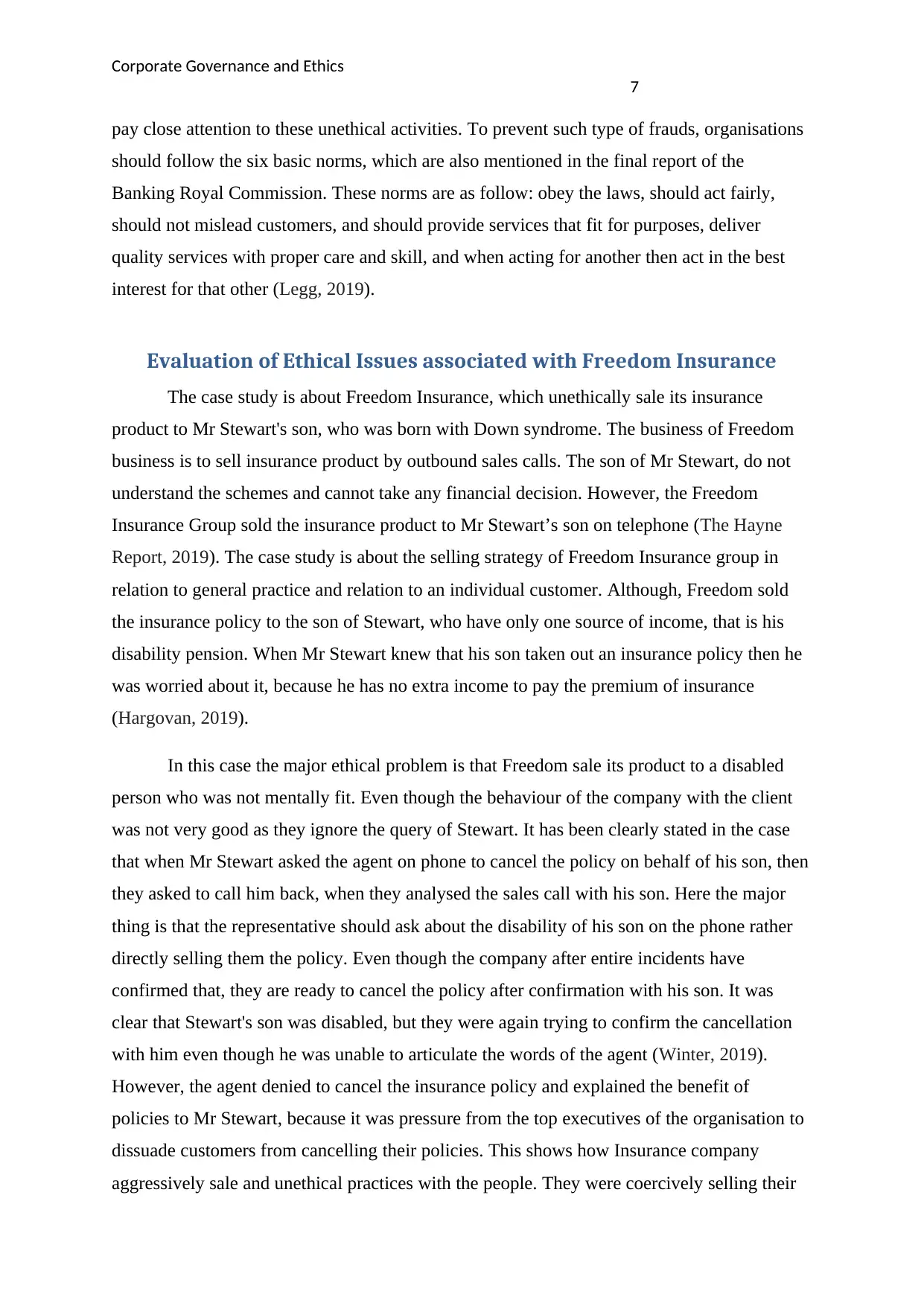
Corporate Governance and Ethics
7
pay close attention to these unethical activities. To prevent such type of frauds, organisations
should follow the six basic norms, which are also mentioned in the final report of the
Banking Royal Commission. These norms are as follow: obey the laws, should act fairly,
should not mislead customers, and should provide services that fit for purposes, deliver
quality services with proper care and skill, and when acting for another then act in the best
interest for that other (Legg, 2019).
Evaluation of Ethical Issues associated with Freedom Insurance
The case study is about Freedom Insurance, which unethically sale its insurance
product to Mr Stewart's son, who was born with Down syndrome. The business of Freedom
business is to sell insurance product by outbound sales calls. The son of Mr Stewart, do not
understand the schemes and cannot take any financial decision. However, the Freedom
Insurance Group sold the insurance product to Mr Stewart’s son on telephone (The Hayne
Report, 2019). The case study is about the selling strategy of Freedom Insurance group in
relation to general practice and relation to an individual customer. Although, Freedom sold
the insurance policy to the son of Stewart, who have only one source of income, that is his
disability pension. When Mr Stewart knew that his son taken out an insurance policy then he
was worried about it, because he has no extra income to pay the premium of insurance
(Hargovan, 2019).
In this case the major ethical problem is that Freedom sale its product to a disabled
person who was not mentally fit. Even though the behaviour of the company with the client
was not very good as they ignore the query of Stewart. It has been clearly stated in the case
that when Mr Stewart asked the agent on phone to cancel the policy on behalf of his son, then
they asked to call him back, when they analysed the sales call with his son. Here the major
thing is that the representative should ask about the disability of his son on the phone rather
directly selling them the policy. Even though the company after entire incidents have
confirmed that, they are ready to cancel the policy after confirmation with his son. It was
clear that Stewart's son was disabled, but they were again trying to confirm the cancellation
with him even though he was unable to articulate the words of the agent (Winter, 2019).
However, the agent denied to cancel the insurance policy and explained the benefit of
policies to Mr Stewart, because it was pressure from the top executives of the organisation to
dissuade customers from cancelling their policies. This shows how Insurance company
aggressively sale and unethical practices with the people. They were coercively selling their
7
pay close attention to these unethical activities. To prevent such type of frauds, organisations
should follow the six basic norms, which are also mentioned in the final report of the
Banking Royal Commission. These norms are as follow: obey the laws, should act fairly,
should not mislead customers, and should provide services that fit for purposes, deliver
quality services with proper care and skill, and when acting for another then act in the best
interest for that other (Legg, 2019).
Evaluation of Ethical Issues associated with Freedom Insurance
The case study is about Freedom Insurance, which unethically sale its insurance
product to Mr Stewart's son, who was born with Down syndrome. The business of Freedom
business is to sell insurance product by outbound sales calls. The son of Mr Stewart, do not
understand the schemes and cannot take any financial decision. However, the Freedom
Insurance Group sold the insurance product to Mr Stewart’s son on telephone (The Hayne
Report, 2019). The case study is about the selling strategy of Freedom Insurance group in
relation to general practice and relation to an individual customer. Although, Freedom sold
the insurance policy to the son of Stewart, who have only one source of income, that is his
disability pension. When Mr Stewart knew that his son taken out an insurance policy then he
was worried about it, because he has no extra income to pay the premium of insurance
(Hargovan, 2019).
In this case the major ethical problem is that Freedom sale its product to a disabled
person who was not mentally fit. Even though the behaviour of the company with the client
was not very good as they ignore the query of Stewart. It has been clearly stated in the case
that when Mr Stewart asked the agent on phone to cancel the policy on behalf of his son, then
they asked to call him back, when they analysed the sales call with his son. Here the major
thing is that the representative should ask about the disability of his son on the phone rather
directly selling them the policy. Even though the company after entire incidents have
confirmed that, they are ready to cancel the policy after confirmation with his son. It was
clear that Stewart's son was disabled, but they were again trying to confirm the cancellation
with him even though he was unable to articulate the words of the agent (Winter, 2019).
However, the agent denied to cancel the insurance policy and explained the benefit of
policies to Mr Stewart, because it was pressure from the top executives of the organisation to
dissuade customers from cancelling their policies. This shows how Insurance company
aggressively sale and unethical practices with the people. They were coercively selling their
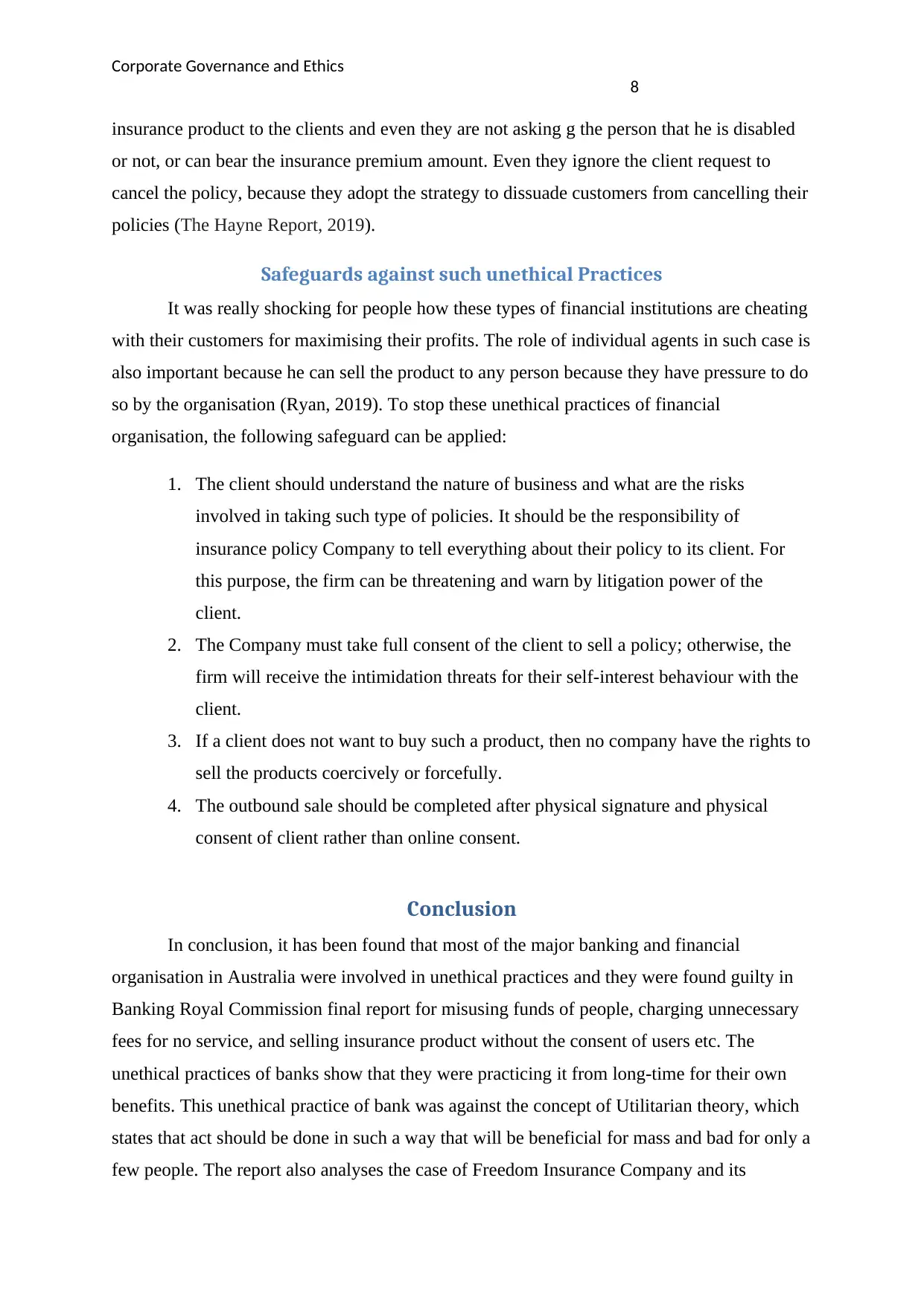
Corporate Governance and Ethics
8
insurance product to the clients and even they are not asking g the person that he is disabled
or not, or can bear the insurance premium amount. Even they ignore the client request to
cancel the policy, because they adopt the strategy to dissuade customers from cancelling their
policies (The Hayne Report, 2019).
Safeguards against such unethical Practices
It was really shocking for people how these types of financial institutions are cheating
with their customers for maximising their profits. The role of individual agents in such case is
also important because he can sell the product to any person because they have pressure to do
so by the organisation (Ryan, 2019). To stop these unethical practices of financial
organisation, the following safeguard can be applied:
1. The client should understand the nature of business and what are the risks
involved in taking such type of policies. It should be the responsibility of
insurance policy Company to tell everything about their policy to its client. For
this purpose, the firm can be threatening and warn by litigation power of the
client.
2. The Company must take full consent of the client to sell a policy; otherwise, the
firm will receive the intimidation threats for their self-interest behaviour with the
client.
3. If a client does not want to buy such a product, then no company have the rights to
sell the products coercively or forcefully.
4. The outbound sale should be completed after physical signature and physical
consent of client rather than online consent.
Conclusion
In conclusion, it has been found that most of the major banking and financial
organisation in Australia were involved in unethical practices and they were found guilty in
Banking Royal Commission final report for misusing funds of people, charging unnecessary
fees for no service, and selling insurance product without the consent of users etc. The
unethical practices of banks show that they were practicing it from long-time for their own
benefits. This unethical practice of bank was against the concept of Utilitarian theory, which
states that act should be done in such a way that will be beneficial for mass and bad for only a
few people. The report also analyses the case of Freedom Insurance Company and its
8
insurance product to the clients and even they are not asking g the person that he is disabled
or not, or can bear the insurance premium amount. Even they ignore the client request to
cancel the policy, because they adopt the strategy to dissuade customers from cancelling their
policies (The Hayne Report, 2019).
Safeguards against such unethical Practices
It was really shocking for people how these types of financial institutions are cheating
with their customers for maximising their profits. The role of individual agents in such case is
also important because he can sell the product to any person because they have pressure to do
so by the organisation (Ryan, 2019). To stop these unethical practices of financial
organisation, the following safeguard can be applied:
1. The client should understand the nature of business and what are the risks
involved in taking such type of policies. It should be the responsibility of
insurance policy Company to tell everything about their policy to its client. For
this purpose, the firm can be threatening and warn by litigation power of the
client.
2. The Company must take full consent of the client to sell a policy; otherwise, the
firm will receive the intimidation threats for their self-interest behaviour with the
client.
3. If a client does not want to buy such a product, then no company have the rights to
sell the products coercively or forcefully.
4. The outbound sale should be completed after physical signature and physical
consent of client rather than online consent.
Conclusion
In conclusion, it has been found that most of the major banking and financial
organisation in Australia were involved in unethical practices and they were found guilty in
Banking Royal Commission final report for misusing funds of people, charging unnecessary
fees for no service, and selling insurance product without the consent of users etc. The
unethical practices of banks show that they were practicing it from long-time for their own
benefits. This unethical practice of bank was against the concept of Utilitarian theory, which
states that act should be done in such a way that will be beneficial for mass and bad for only a
few people. The report also analyses the case of Freedom Insurance Company and its
⊘ This is a preview!⊘
Do you want full access?
Subscribe today to unlock all pages.

Trusted by 1+ million students worldwide
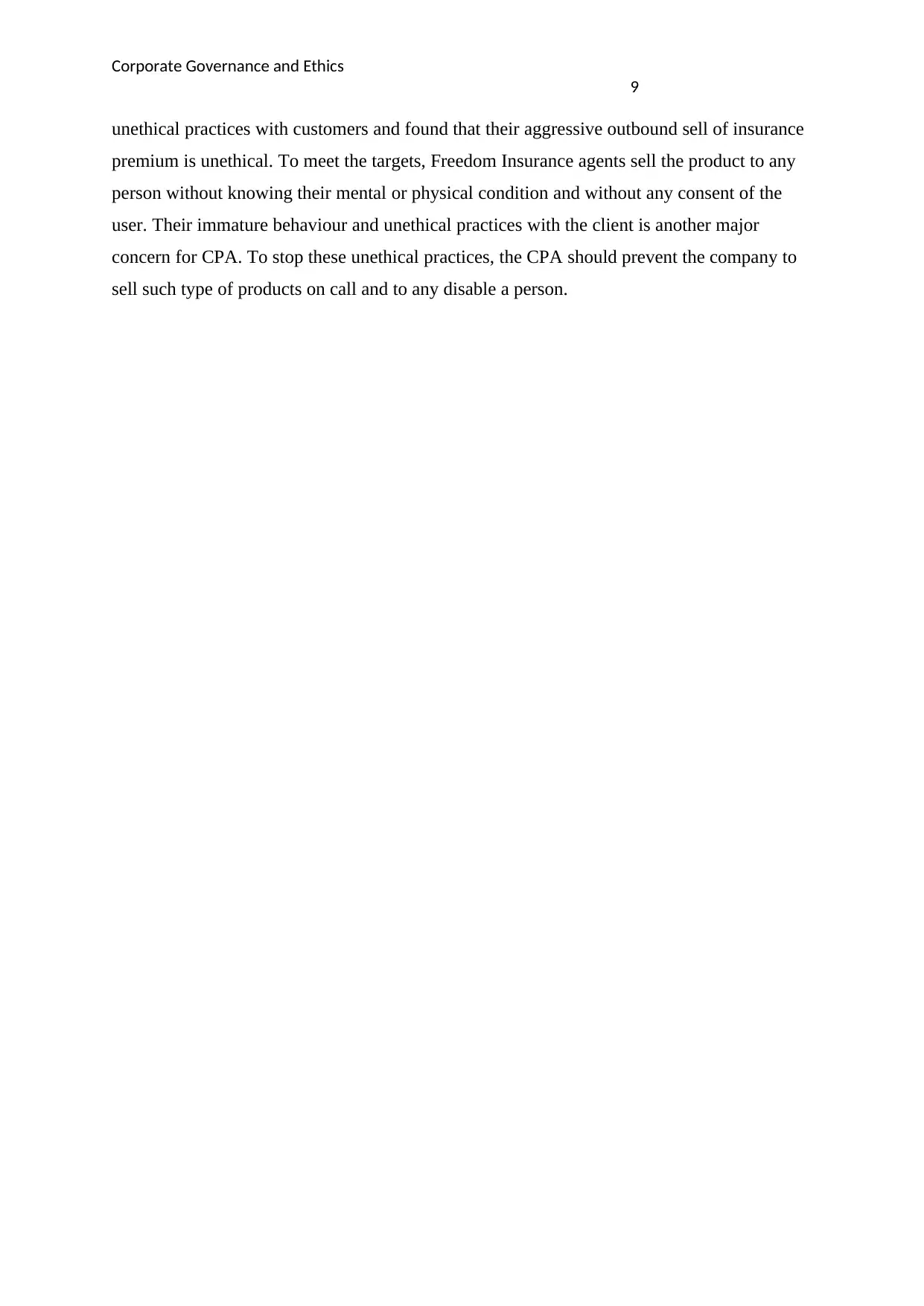
Corporate Governance and Ethics
9
unethical practices with customers and found that their aggressive outbound sell of insurance
premium is unethical. To meet the targets, Freedom Insurance agents sell the product to any
person without knowing their mental or physical condition and without any consent of the
user. Their immature behaviour and unethical practices with the client is another major
concern for CPA. To stop these unethical practices, the CPA should prevent the company to
sell such type of products on call and to any disable a person.
9
unethical practices with customers and found that their aggressive outbound sell of insurance
premium is unethical. To meet the targets, Freedom Insurance agents sell the product to any
person without knowing their mental or physical condition and without any consent of the
user. Their immature behaviour and unethical practices with the client is another major
concern for CPA. To stop these unethical practices, the CPA should prevent the company to
sell such type of products on call and to any disable a person.
Paraphrase This Document
Need a fresh take? Get an instant paraphrase of this document with our AI Paraphraser
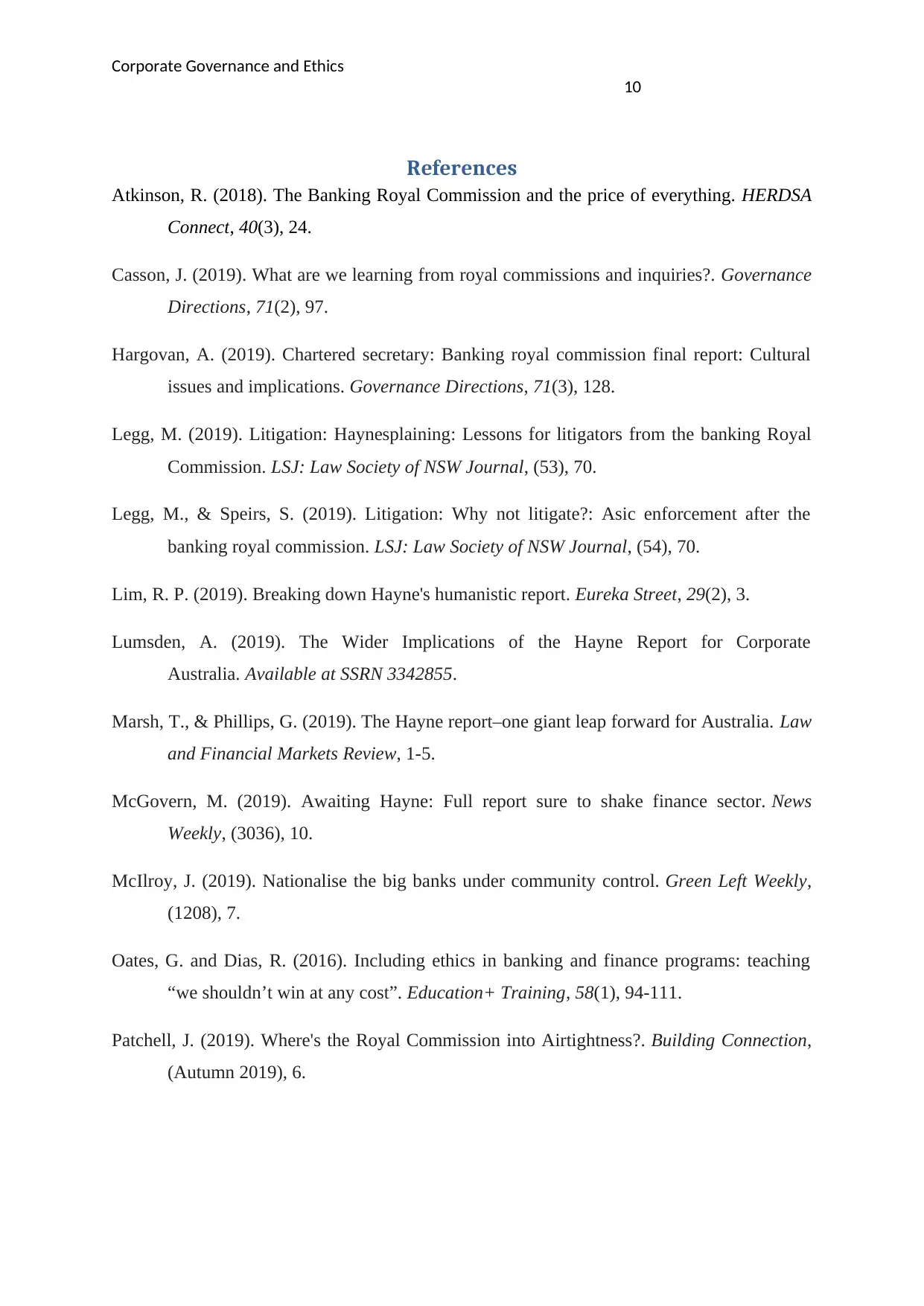
Corporate Governance and Ethics
10
References
Atkinson, R. (2018). The Banking Royal Commission and the price of everything. HERDSA
Connect, 40(3), 24.
Casson, J. (2019). What are we learning from royal commissions and inquiries?. Governance
Directions, 71(2), 97.
Hargovan, A. (2019). Chartered secretary: Banking royal commission final report: Cultural
issues and implications. Governance Directions, 71(3), 128.
Legg, M. (2019). Litigation: Haynesplaining: Lessons for litigators from the banking Royal
Commission. LSJ: Law Society of NSW Journal, (53), 70.
Legg, M., & Speirs, S. (2019). Litigation: Why not litigate?: Asic enforcement after the
banking royal commission. LSJ: Law Society of NSW Journal, (54), 70.
Lim, R. P. (2019). Breaking down Hayne's humanistic report. Eureka Street, 29(2), 3.
Lumsden, A. (2019). The Wider Implications of the Hayne Report for Corporate
Australia. Available at SSRN 3342855.
Marsh, T., & Phillips, G. (2019). The Hayne report–one giant leap forward for Australia. Law
and Financial Markets Review, 1-5.
McGovern, M. (2019). Awaiting Hayne: Full report sure to shake finance sector. News
Weekly, (3036), 10.
McIlroy, J. (2019). Nationalise the big banks under community control. Green Left Weekly,
(1208), 7.
Oates, G. and Dias, R. (2016). Including ethics in banking and finance programs: teaching
“we shouldn’t win at any cost”. Education+ Training, 58(1), 94-111.
Patchell, J. (2019). Where's the Royal Commission into Airtightness?. Building Connection,
(Autumn 2019), 6.
10
References
Atkinson, R. (2018). The Banking Royal Commission and the price of everything. HERDSA
Connect, 40(3), 24.
Casson, J. (2019). What are we learning from royal commissions and inquiries?. Governance
Directions, 71(2), 97.
Hargovan, A. (2019). Chartered secretary: Banking royal commission final report: Cultural
issues and implications. Governance Directions, 71(3), 128.
Legg, M. (2019). Litigation: Haynesplaining: Lessons for litigators from the banking Royal
Commission. LSJ: Law Society of NSW Journal, (53), 70.
Legg, M., & Speirs, S. (2019). Litigation: Why not litigate?: Asic enforcement after the
banking royal commission. LSJ: Law Society of NSW Journal, (54), 70.
Lim, R. P. (2019). Breaking down Hayne's humanistic report. Eureka Street, 29(2), 3.
Lumsden, A. (2019). The Wider Implications of the Hayne Report for Corporate
Australia. Available at SSRN 3342855.
Marsh, T., & Phillips, G. (2019). The Hayne report–one giant leap forward for Australia. Law
and Financial Markets Review, 1-5.
McGovern, M. (2019). Awaiting Hayne: Full report sure to shake finance sector. News
Weekly, (3036), 10.
McIlroy, J. (2019). Nationalise the big banks under community control. Green Left Weekly,
(1208), 7.
Oates, G. and Dias, R. (2016). Including ethics in banking and finance programs: teaching
“we shouldn’t win at any cost”. Education+ Training, 58(1), 94-111.
Patchell, J. (2019). Where's the Royal Commission into Airtightness?. Building Connection,
(Autumn 2019), 6.
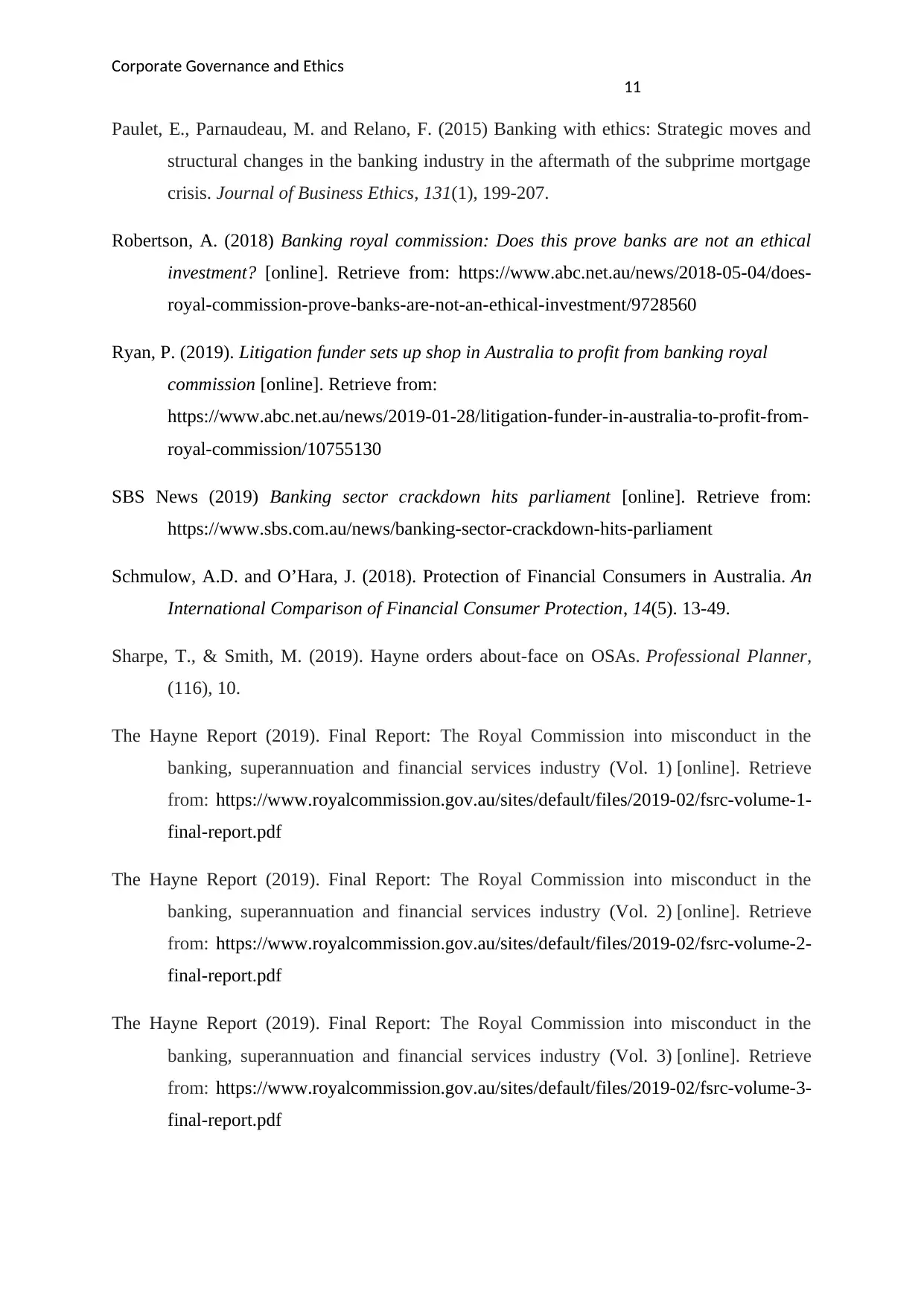
Corporate Governance and Ethics
11
Paulet, E., Parnaudeau, M. and Relano, F. (2015) Banking with ethics: Strategic moves and
structural changes in the banking industry in the aftermath of the subprime mortgage
crisis. Journal of Business Ethics, 131(1), 199-207.
Robertson, A. (2018) Banking royal commission: Does this prove banks are not an ethical
investment? [online]. Retrieve from: https://www.abc.net.au/news/2018-05-04/does-
royal-commission-prove-banks-are-not-an-ethical-investment/9728560
Ryan, P. (2019). Litigation funder sets up shop in Australia to profit from banking royal
commission [online]. Retrieve from:
https://www.abc.net.au/news/2019-01-28/litigation-funder-in-australia-to-profit-from-
royal-commission/10755130
SBS News (2019) Banking sector crackdown hits parliament [online]. Retrieve from:
https://www.sbs.com.au/news/banking-sector-crackdown-hits-parliament
Schmulow, A.D. and O’Hara, J. (2018). Protection of Financial Consumers in Australia. An
International Comparison of Financial Consumer Protection, 14(5). 13-49.
Sharpe, T., & Smith, M. (2019). Hayne orders about-face on OSAs. Professional Planner,
(116), 10.
The Hayne Report (2019). Final Report: The Royal Commission into misconduct in the
banking, superannuation and financial services industry (Vol. 1) [online]. Retrieve
from: https://www.royalcommission.gov.au/sites/default/files/2019-02/fsrc-volume-1-
final-report.pdf
The Hayne Report (2019). Final Report: The Royal Commission into misconduct in the
banking, superannuation and financial services industry (Vol. 2) [online]. Retrieve
from: https://www.royalcommission.gov.au/sites/default/files/2019-02/fsrc-volume-2-
final-report.pdf
The Hayne Report (2019). Final Report: The Royal Commission into misconduct in the
banking, superannuation and financial services industry (Vol. 3) [online]. Retrieve
from: https://www.royalcommission.gov.au/sites/default/files/2019-02/fsrc-volume-3-
final-report.pdf
11
Paulet, E., Parnaudeau, M. and Relano, F. (2015) Banking with ethics: Strategic moves and
structural changes in the banking industry in the aftermath of the subprime mortgage
crisis. Journal of Business Ethics, 131(1), 199-207.
Robertson, A. (2018) Banking royal commission: Does this prove banks are not an ethical
investment? [online]. Retrieve from: https://www.abc.net.au/news/2018-05-04/does-
royal-commission-prove-banks-are-not-an-ethical-investment/9728560
Ryan, P. (2019). Litigation funder sets up shop in Australia to profit from banking royal
commission [online]. Retrieve from:
https://www.abc.net.au/news/2019-01-28/litigation-funder-in-australia-to-profit-from-
royal-commission/10755130
SBS News (2019) Banking sector crackdown hits parliament [online]. Retrieve from:
https://www.sbs.com.au/news/banking-sector-crackdown-hits-parliament
Schmulow, A.D. and O’Hara, J. (2018). Protection of Financial Consumers in Australia. An
International Comparison of Financial Consumer Protection, 14(5). 13-49.
Sharpe, T., & Smith, M. (2019). Hayne orders about-face on OSAs. Professional Planner,
(116), 10.
The Hayne Report (2019). Final Report: The Royal Commission into misconduct in the
banking, superannuation and financial services industry (Vol. 1) [online]. Retrieve
from: https://www.royalcommission.gov.au/sites/default/files/2019-02/fsrc-volume-1-
final-report.pdf
The Hayne Report (2019). Final Report: The Royal Commission into misconduct in the
banking, superannuation and financial services industry (Vol. 2) [online]. Retrieve
from: https://www.royalcommission.gov.au/sites/default/files/2019-02/fsrc-volume-2-
final-report.pdf
The Hayne Report (2019). Final Report: The Royal Commission into misconduct in the
banking, superannuation and financial services industry (Vol. 3) [online]. Retrieve
from: https://www.royalcommission.gov.au/sites/default/files/2019-02/fsrc-volume-3-
final-report.pdf
⊘ This is a preview!⊘
Do you want full access?
Subscribe today to unlock all pages.

Trusted by 1+ million students worldwide
1 out of 13
Related Documents
Your All-in-One AI-Powered Toolkit for Academic Success.
+13062052269
info@desklib.com
Available 24*7 on WhatsApp / Email
![[object Object]](/_next/static/media/star-bottom.7253800d.svg)
Unlock your academic potential
Copyright © 2020–2026 A2Z Services. All Rights Reserved. Developed and managed by ZUCOL.





